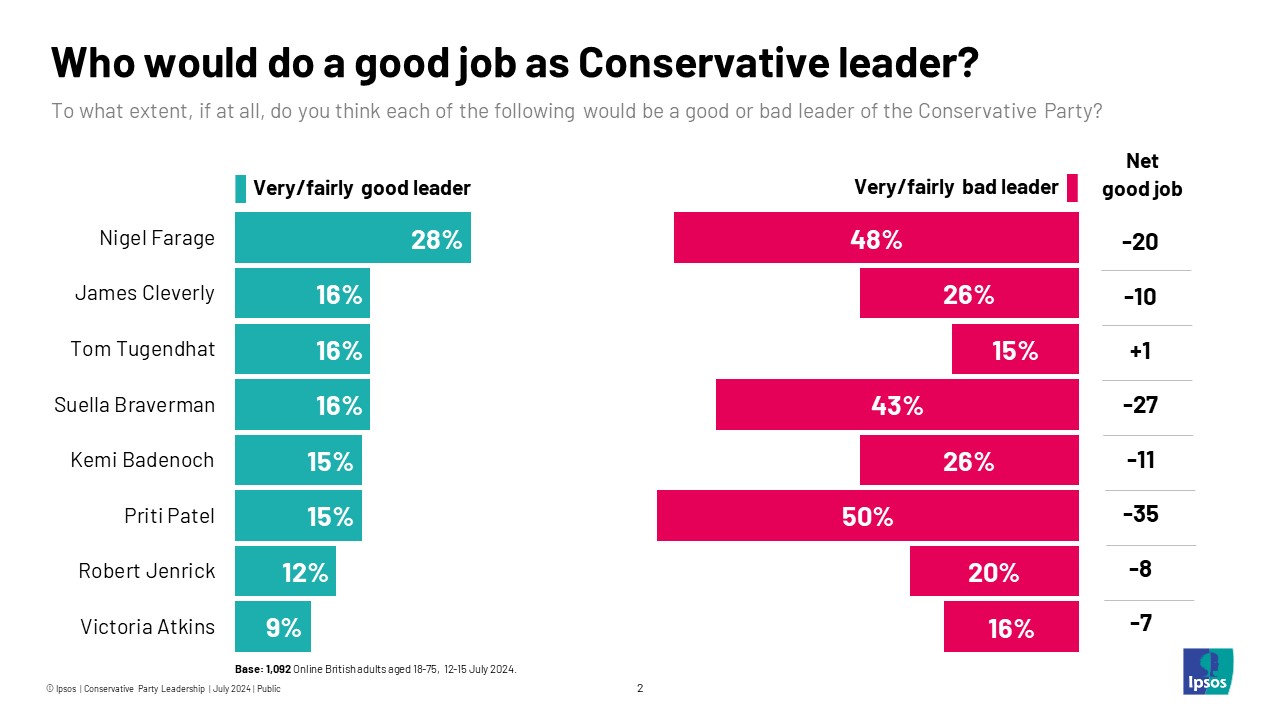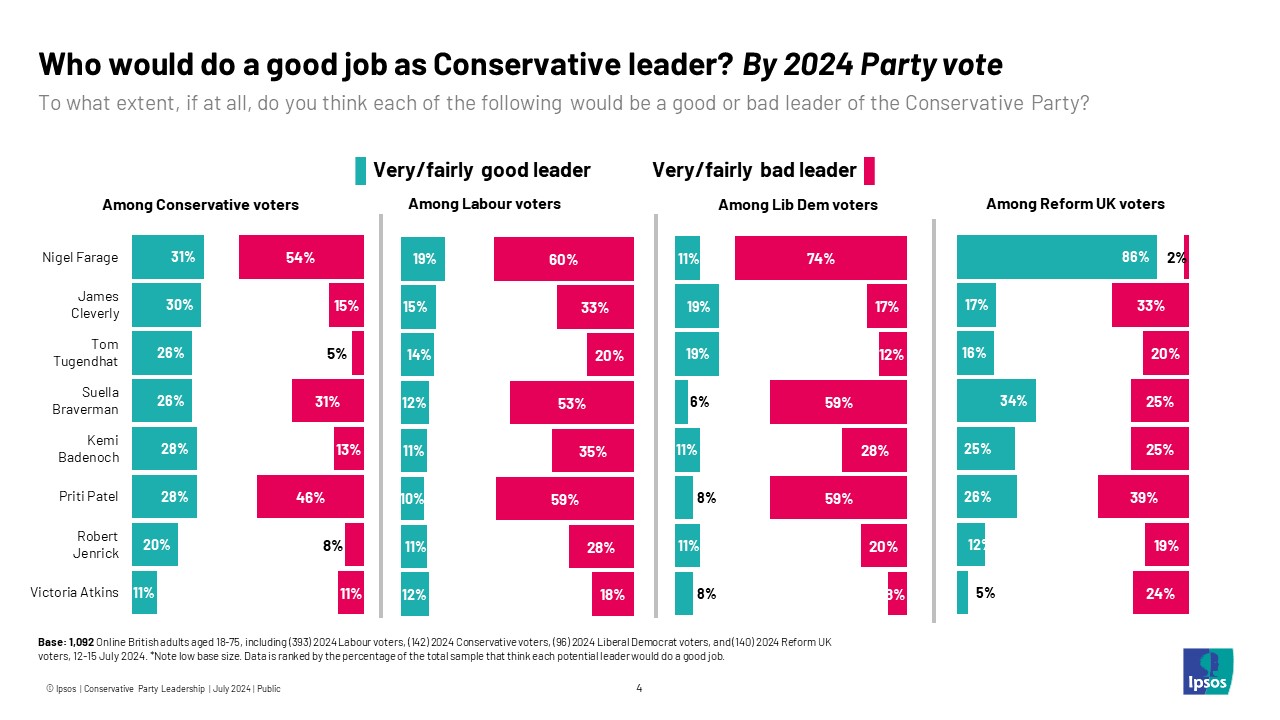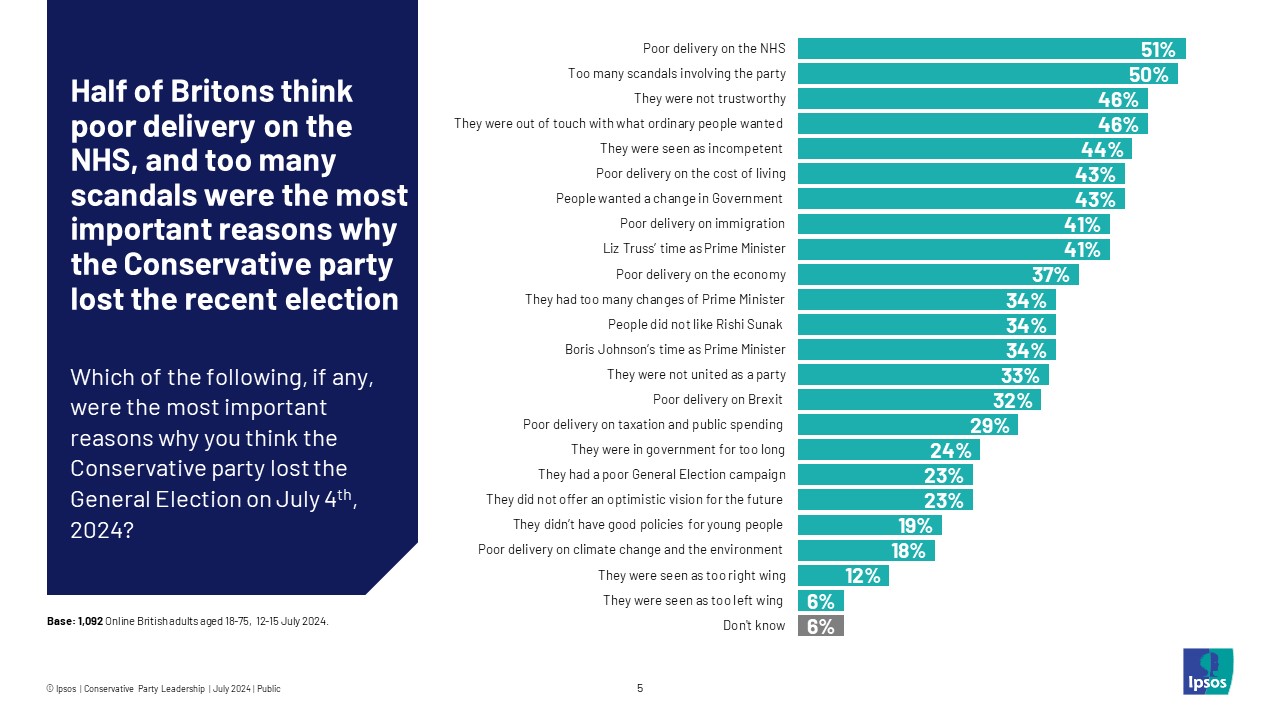Voters split on future leader of the Conservative Party and reasons for election defeat
- Potential leadership candidates tend to divide opinion or are not well known
- Poor delivery on NHS and too many scandals most common reasons cited for defeat – but Reform UK voters overwhelmingly cite immigration as key reason
New Ipsos polling, taken July 12-15 2024, asked the British public who they think would do a good or bad job as Conservative Party leader and what the key reasons were for their recent General Election defeat.
No consensus on who would do a good job as Conservative leader
- When asked if different hypothetical candidates would make good or bad leaders of the Conservative Party, Nigel Farage is the most likely to be seen as someone that would do a good job (28%). However, almost half of the public think he would do a bad job (48%).
- For the public as a whole, many of the hypothetical candidates are not well known. In fact, only three candidates have half or more Britons offering an opinion one way or another.

When we look at opinions by different groups of voters from the recent General Election, we can see opinions vary.
- There is no consensus amongst 2024 Conservatives as to who would be most likely to do a good job, but Nigel Farage (54%) and Priti Patel (46%) are most likely to be seen as those that would do a bad job. 86% of Reform voters think Nigel Farage would do a good job and they are net positive about Suella Braverman (+9).
- However, a majority of Labour and Lib Dem voters are negative about Farage, Braverman, and Patel. Although one in five Labour voters think Farage would do a good job (19%) and one in five Lib Dems think Tom Tugendhat and James Cleverly would do a good job (both 19%).

Poor delivery on the NHS and scandals top reasons why Conservatives lost – though immigration key for Reform UK / Leave voters
Elsewhere in the poll, the public were asked what they thought were the most important factors behind the Conservative party’s election defeat. Half named poor performance on the NHS (51%) and too many scandals (50%). This was followed by a lack of trustworthiness and being out of touch with ordinary people on 46% each.

However, the public were split on the key reasons for the Conservative party’s defeat based on how they voted at the recent General Election. For those that stayed with the Conservative Party, 53% blamed Liz Truss’ time as Prime Minister, followed by poor delivery on immigration (49%), and too many scandals (47%). Reform UK voters overwhelmingly said poor delivery on immigration was the key reason for the Conservatives' defeat (70%).

For those voting Labour, a range of issues were mentioned by half or more, but the number one issue cited was poor delivery on the NHS (63%). This was followed by scandals (54%), not being trustworthy (54%) and poor delivery on the cost of living (53%). For Lib Dem voters, around 6 in 10 talked about scandals (64%), being out of touch (60%), poor delivery on the NHS (59%) and not being trustworthy (59%).
Ipsos Director of Politics Keiran Pedley said of the findings:
Whoever the new Conservative Party leader is, they will need to diagnose why the party lost the recent General Election and come up with a plan for how to respond. However, these findings show there is no clear public consensus on why they lost. Reform UK / Leave supporters tend to point to immigration, whereas others point to public services, various scandals that took place when the Conservatives were in office and a general sense of a party out of touch. In this context, it is perhaps no surprise that there is no public consensus about who the next leader should be. Those popular on the right tend to divide opinion with the public as a whole and many of the other candidates are relative unknowns. For lots of reasons, this feels like a leadership contest that is hard to call.
Technical note
Ipsos interviewed a representative sample of 1,092 adults aged 18-75 across Great Britain, including 142 who voted Conservative at the last election. Polling was conducted online between 12-15 July 2024. Data are weighted to match the profile of the population. All polls are subject to a wide range of potential sources of error.






